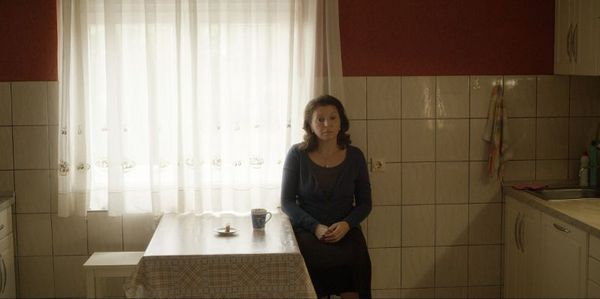Eye For Film >> Movies >> A Good Wife (2016) Film Review
A Good Wife
Reviewed by: Amber Wilkinson

One way to ensure a good role in a film is to write your own and veteran Serbian star Mirjana Karanovic does just that with her directorial debut, which she co-scripts with Stevan Filipovic and Darko Lungulov (who have both previously directed her). The lingering effect of the conflict on women is one that Karanovic has returned to repeatedly throughout her career, through roles in the likes of Grbavica, Fraulein and Witnesses and here the past again spills out like the contents of a burst bin bag, tainting all it touches.
She and her collaborators create a tense character study of Milena, a woman facing unexpected threats to her sense of self - both from within her own body and from her husband's past. While the film's cancer metaphor may sound like a blunt instrument with which to hit the aftermath of the Yugoslav civil war, Karanovic's understated direction and intense performance sell the story on a much more personal level.

Milena's vulnerability is brought to the fore in an opening scene in which she is literally naked, inspecting her breasts, with the Big C soon confirmed. At one point she is told, "we'll do reconstruction, everything will look the same" but Milena knows that on a fundamental level things have shifted. The same is true of her homelife where, initially, she seems to have a decent upper middle-class lot. A chance - and somewhat convenient from a scripting perpsective - discovery calls her to re-examine the actions of her husband Vlada (Boris Isakovic) and as she starts to question her own blindness to his war activities, the rosy glow begins to fade away from other aspects of life as she perceived them.
For Milena, dawning awareness means panic, leading her to frantically clean, as though throwing all the things that previously held her life together - motherhood, being a dutiful spouse - into overdrive. It is here that Karanovi's film becomes not just a political point-scorer but a more subtle lifter of stones to consider the sexual political issues facing middle-aged Serbian women in the years since peace resumed. She broadens out the consideration of Milena to other women in her circle, all seemingly more going through the motions of marriage than actively enjoying it.
Karanovic and Isakovic judge the emotional beats perfectly, subtly shifting a relationship from something stable to extremely volatile. The younger generation of the family is less fleshed out but Karanovic also uses them to suggest hope and more negative attitudes tussling for supremacy, with her son viewing her as little more than the provider of clean washing, while her daughter is estranged from her dad because of human rights work. The direction and writing may show signs of first-time work but Karanovic's fearless performance is one of an actress right on the top of her game that smooths over the cracks in plausibility and holds you hard in its gaze.
Reviewed on: 29 Mar 2016














